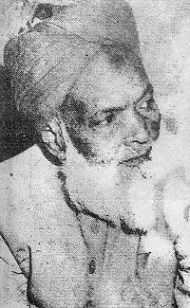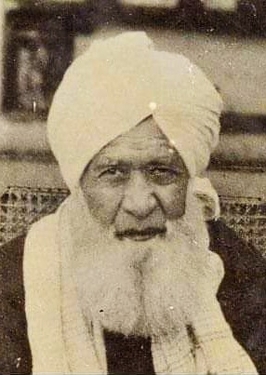
Rashīd Aḥmad ibn Hidāyat Aḥmad Ayyūbī Anṣārī Gangohī was an Indian Deobandi Islamic scholar, a leading figure of the Deobandi jurist and scholar of hadith, author of Fatawa-e-Rashidiya. His lineage reaches back to Abu Ayyub al-Ansari.
Musannaf Abd al-Razzaq al-Sanʿani is an early hadith collection compiled by the eighth-century Yemeni scholar ʽAbd al-Razzaq al-Sanʽani. As a collection of the musannaf genre, it contains over 18,000 traditions arranged in topical order.
Manazir Ahsan Gilani was an Indian Sunni Islamic scholar and former Dean of the Faculty of Theology at Osmania University. Some of his notable works include Tadwin-e-Hadith, Muqaddama Tadwin-e-Fiqh, Sawanih-e-Abu Dharr Ghifari, and Sawanih-e-Qasmi. Muhammad Hamidullah, a historian and hadith researcher, was among his students.

Muḥammad Manz̤oor Nomānī was an Indian Islamic scholar. Prominent among his written works are Maariful Hadith, Islam Kya Hai?, and Khomeini and the Iranian Revolution.
Muhammad Yaqub Nanautawi (1833–1884) was an Indian Islamic scholar, and one of the earliest teachers of Islamic Madrassa in Deoband, famously called Darul Uloom Deoband in India. He was the first principal of Darul Uloom Deoband.

Muḥammad Shafī‘ ibn Muḥammad Yāsīn ‘Us̱mānī Deobandī, often referred to as Mufti Muhammad Shafi, was a Pakistani Sunni Islamic scholar of the Deobandi school of Islamic thought.

Idris Kandhlawi was a Pakistani Sunni scholar during the mid-twentieth century, widely recognized for his contributions to various fields of Islamic studies, including hadith, Quranic studies, Islamic jurisprudence, Prophetic biography, and theology. Holding the titles of Sheikh al-Hadith and Sheikh al-Tafsir, he traced his lineage to Abu Bakr on his father's side and Umar on his mother's side. He studied in Thana Bhawan under Ashraf Ali Thanwi. He studied hadith, first at Mazahir Uloom under Khalil Ahmad Saharanpuri, and later at Darul Uloom Deoband under Anwar Shah Kashmiri. He started his professional career at Madrasa Aminia and later went to Darul Uloom Deoband. In 1929 he took a position in Hyderabad State, where he had access to the Asafia Library. This experience enabled him to produce a five-volume Arabic commentary on Mishkat al-Masabih titled Al-Taleeq al-Sabeeh, of which the first four volumes were published in Damascus. His scholarly work garnered recognition in the Arab world. He later assumed the roles of Sheikh al-Tafsir at Darul Uloom Deoband and Sheikh al-Hadith wa al-Tafsir at Jamia Ashrafia. In addition, he served as the Chancellor of Islamia University of Bahawalpur during its tenure as Jamia Abbasia.

Darul Uloom Mau is an Islamic Madrasa which was established in Mau in 1875.
Asghar Hussain Deobandi was an Indian Sunni Muslim scholar who co-founded Madrasatul Islah.
Deobandi hadith studies is a field of Islamic scholarship within the Deobandi movement that critically examines the sayings and actions of the Islamic prophet Muhammad as recorded in the Hadith literature. The Deobandi approach to Hadith studies is based on the principles of the classical scholars of hadith.
Nematullah Azami, also written as Nematullah Azmi and Ni'matullah Azami, is an Indian Islamic hadith scholar, a commentator on the Quran (mufassir), and a faqīh. He is the president of India's Islamic Fiqh Academy. He has also been serving as a senior lecturer at Darul Uloom Deoband for forty years.
Sayed Sirajussajidin Katki was an Indian Islamic scholar, poet, and orator. He dedicated almost his entire career to Jamia Islamia Markazul Uloom, Sungra. He also served as the 4th President of Jamiat Ulama Odisha and the second Amīr-e-Sharī'at of Imārat-e-Shar'ia, Odisha.
Ishtiaque Ahmad Qasmi is an Indian Islamic scholar, mufti, and writer. He has been serving as a teacher at Darul Uloom Deoband since 2008. He is an alumnus of Darul Uloom Deoband and Maulana Azad National Urdu University.

Muhammad Ibrahim Balyawi (1887–1967), also spelt as Muhammad Ibrahim Balliavi, was an Indian Sunni Muslim scholar who served as the 6th Principal of Darul Uloom Deoband. He spent almost 50 years instructing Hadith, Mantiq, Islamic philosophy, and other subjects at Darul Uloom Deoband.
Naseer Ahmad Khan (1918–2010), also written as Maulana Naseer Ahmad Khan and Naseer Ahmad Khan Bulandshahri, was an Indian Islamic scholar and muhaddith. He served as a professor at Darul Uloom Deoband for approximately sixty-five years, during which he taught Sahih al-Bukhari for thirty-two years.
Mahdi Hasan Shahjahanpuri (1882–1976), also known as Mufti Mehdi Hasan and Mahdi Hasan Gilani Qadri, was an Indian Islamic scholar and mufti. He served as grand mufti at Darul Uloom Deoband for twenty years. He was an alumnus of Madrasa Aminia and Darul Uloom Deoband. He was a student of Mahmud Hasan Deobandi and Kifayatullah Dehlawi. Along with jurisprudence, he also had access to hadith and biographical evaluation. His literary works include Rijāl-u-Kitāb al-Āthār, Sharh-u-Balāghāt-i-Muhammad Fī Kitāb al-Āthār, Al-la'ali al-Masnoo'ah fī al-Riwāyāti al-Marjoo'ah, and a critical commentary on certain ideas of Ibn Hazm in the Science of Hadith entitled As-Sayf al-mujalla 'ala al-Muḥalla. He has done research and commentary work on Muhammad al-Shaybani's two books, Kitab al-Hujjah Alā Ahl al-Madīnah and Kitab al-Āthār.
Habibur Rahman Usmani (1860–1929), also written as Habibur Rahman Deobandi and Maulāna Habib al-Rahmān, was an Indian Islamic scholar, Arabic writer and poet, and an Islamic jurist. He served as Deputy Vice-Chancellor, then Vice-Chancellor for the VC Office of Darul Uloom Deoband, for nearly twenty-three years. He succeeded Hafiz Muhammad Ahmad as Grand Mufti of Hyderabad State for about one year. His students included Shabbir Ahmad Usmani, Manazir Ahsan Gilani, Muhammad Shafi Deobandi, Habib al-Rahman al-A'zami, Muhammad Idris Kandhlawi, Atiqur Rahman Usmani, Qari Muhammad Tayyib, Badre Alam Merathi, Hifzur Rahman Seoharwi, Saeed Ahmad Akbarabadi, Manzoor Nomani, and Yusuf Banuri.
Abdullah Maroofi is an Indian Islamic scholar, mufti, and writer who specialises in Hadith studies. Since 2001, he has been serving as a lecturer in the department of specialisation in Hadith at Darul Uloom Deoband and is currently the supervisor of the department.
Habibur Rahman Azami, also written as Habibur Rahman Qasmi Azmi, was an Indian Islamic scholar, writer, and expert in the field of biographical evaluation of hadith narrators. He served as a professor of hadith at Darul Uloom Deoband. He served as the 6th editor-in-chief of Monthly Darul Uloom. He authored several books, including Shuyukh al-Imam Abi Dawud al-Sijistani fī Kitab al-Sunan, Tazkirah Ulama-e-Azamgarh, Ajodhya ke Islami Aathar, and Babri Masjid: Haqaiq aur Afsanay.







